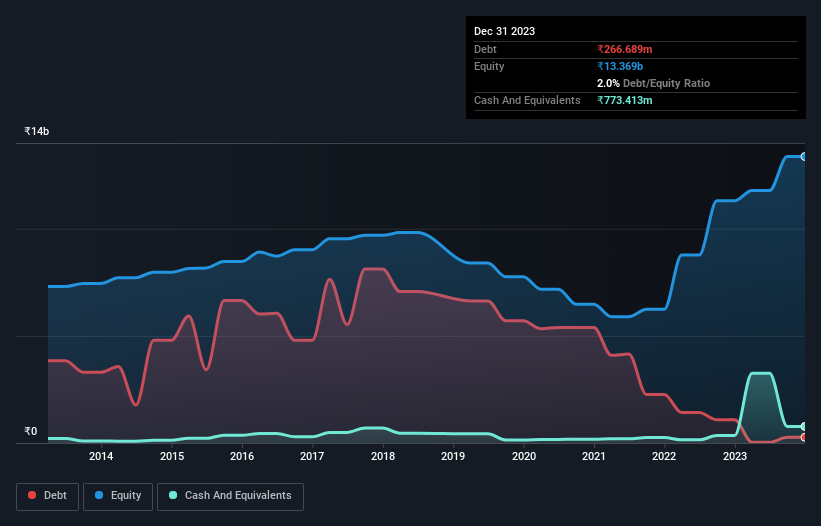David Iben put it well when he said, 'Volatility is not a risk we care about. What we care about is avoiding the permanent loss of capital.' So it seems the smart money knows that debt - which is usually involved in bankruptcies - is a very important factor, when you assess how risky a company is. Importantly, Ganesh Housing Corporation Limited (NSE:GANESHHOUC) does carry debt. But should shareholders be worried about its use of debt?
When Is Debt Dangerous?
Generally speaking, debt only becomes a real problem when a company can't easily pay it off, either by raising capital or with its own cash flow. If things get really bad, the lenders can take control of the business. However, a more common (but still painful) scenario is that it has to raise new equity capital at a low price, thus permanently diluting shareholders. Having said that, the most common situation is where a company manages its debt reasonably well - and to its own advantage. The first step when considering a company's debt levels is to consider its cash and debt together.
See our latest analysis for Ganesh Housing
How Much Debt Does Ganesh Housing Carry?
The image below, which you can click on for greater detail, shows that Ganesh Housing had debt of ₹266.7m at the end of September 2023, a reduction from ₹1.09b over a year. But on the other hand it also has ₹773.4m in cash, leading to a ₹506.7m net cash position.

How Strong Is Ganesh Housing's Balance Sheet?
The latest balance sheet data shows that Ganesh Housing had liabilities of ₹2.91b due within a year, and liabilities of ₹280.5m falling due after that. On the other hand, it had cash of ₹773.4m and ₹3.02b worth of receivables due within a year. So it actually has ₹597.4m more liquid assets than total liabilities.
This state of affairs indicates that Ganesh Housing's balance sheet looks quite solid, as its total liabilities are just about equal to its liquid assets. So it's very unlikely that the ₹57.1b company is short on cash, but still worth keeping an eye on the balance sheet. Simply put, the fact that Ganesh Housing has more cash than debt is arguably a good indication that it can manage its debt safely.
Even more impressive was the fact that Ganesh Housing grew its EBIT by 185% over twelve months. That boost will make it even easier to pay down debt going forward. The balance sheet is clearly the area to focus on when you are analysing debt. But it is Ganesh Housing's earnings that will influence how the balance sheet holds up in the future. So when considering debt, it's definitely worth looking at the earnings trend. Click here for an interactive snapshot.
Finally, while the tax-man may adore accounting profits, lenders only accept cold hard cash. Ganesh Housing may have net cash on the balance sheet, but it is still interesting to look at how well the business converts its earnings before interest and tax (EBIT) to free cash flow, because that will influence both its need for, and its capacity to manage debt. Over the most recent three years, Ganesh Housing recorded free cash flow worth 50% of its EBIT, which is around normal, given free cash flow excludes interest and tax. This free cash flow puts the company in a good position to pay down debt, when appropriate.
Summing Up
While we empathize with investors who find debt concerning, you should keep in mind that Ganesh Housing has net cash of ₹506.7m, as well as more liquid assets than liabilities. And it impressed us with its EBIT growth of 185% over the last year. So is Ganesh Housing's debt a risk? It doesn't seem so to us. When analysing debt levels, the balance sheet is the obvious place to start. But ultimately, every company can contain risks that exist outside of the balance sheet. For example Ganesh Housing has 2 warning signs (and 1 which is concerning) we think you should know about.
When all is said and done, sometimes its easier to focus on companies that don't even need debt. Readers can access a list of growth stocks with zero net debt 100% free, right now.
New: Manage All Your Stock Portfolios in One Place
We've created the ultimate portfolio companion for stock investors, and it's free.
• Connect an unlimited number of Portfolios and see your total in one currency
• Be alerted to new Warning Signs or Risks via email or mobile
• Track the Fair Value of your stocks
Have feedback on this article? Concerned about the content? Get in touch with us directly. Alternatively, email editorial-team (at) simplywallst.com.
This article by Simply Wall St is general in nature. We provide commentary based on historical data and analyst forecasts only using an unbiased methodology and our articles are not intended to be financial advice. It does not constitute a recommendation to buy or sell any stock, and does not take account of your objectives, or your financial situation. We aim to bring you long-term focused analysis driven by fundamental data. Note that our analysis may not factor in the latest price-sensitive company announcements or qualitative material. Simply Wall St has no position in any stocks mentioned.
About NSEI:GANESHHOU
Ganesh Housing
Engages in the real estate and construction businesses in India.
Flawless balance sheet with solid track record and pays a dividend.
Market Insights
Community Narratives



